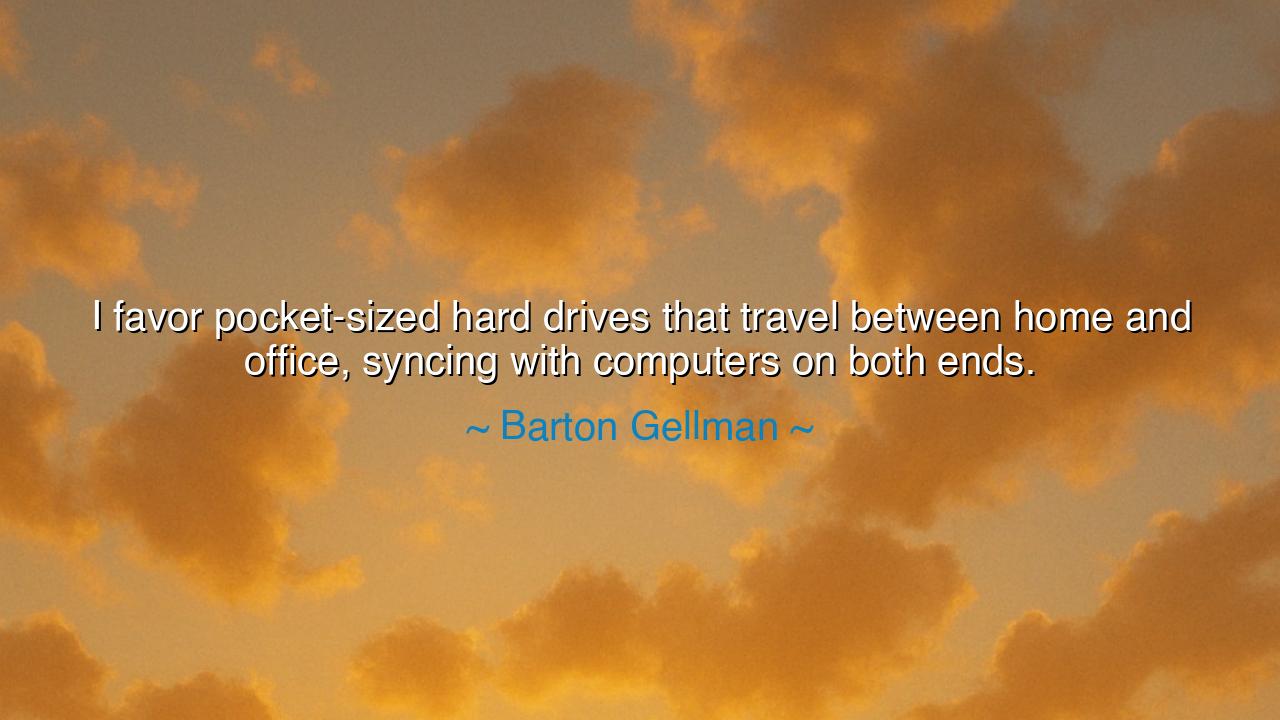
I favor pocket-sized hard drives that travel between home and
I favor pocket-sized hard drives that travel between home and office, syncing with computers on both ends.






“I favor pocket-sized hard drives that travel between home and office, syncing with computers on both ends.” — Barton Gellman
Hear the words of Barton Gellman, a chronicler of truth and a keeper of knowledge, whose hands have held both pen and power. In this reflection, he speaks not merely of a pocket-sized hard drive, but of connection, of continuity, of the sacred bridge between the worlds of labor and life. His words, though rooted in the language of machines, carry the timeless wisdom of balance—the union of movement and memory, of preservation and purpose. He reminds us that though the tools may change, the human desire to carry one’s work, one’s ideas, and one’s truth from place to place is as old as civilization itself.
In ancient times, the scribes of Egypt carried their tablets of wax and clay, engraved with knowledge that could outlast empires. The scholars of Greece bore scrolls between academies, ensuring that the flame of thought did not perish with the setting sun. Gellman, in the modern age, is heir to that same lineage. His portable drive is no different from those ancient tablets—it is a vessel for wisdom, a guardian of memory. Yet it is also more: it is a symbol of freedom, of the individual’s power to move seamlessly between spaces, to be unbound by walls or offices, to let thought and creation flow wherever the spirit leads.
The hard drive, small and unassuming, contains multitudes. Within its metal shell lies the weight of years—writing, research, correspondence, the very echoes of a human mind at work. To carry such a thing is to carry a piece of one’s soul. In Gellman’s words, we sense both practicality and reverence: he “favors” this device not only for its function, but for its meaning. It allows him to be whole, wherever he stands. It binds home and office, the personal and the professional, the intimate and the public. In this union lies the essence of the modern struggle—to remain one person, even in a world divided by duty.
And yet, hidden within this modern convenience lies an ancient challenge. For as long as man has carried tools of knowledge, he has risked losing them—to theft, to corruption, to time. The scholar’s scroll could burn; the monk’s manuscript could be seized; the digital traveler’s drive could be stolen or erased. Thus, Gellman’s reflection carries also a note of vigilance. To bear knowledge between realms is to hold both power and responsibility. The one who carries such a vessel must guard it with care, for within it lies not only his labor, but the trust of those who share his world.
We are reminded of the story of Archimedes, the ancient mathematician who, even as his city fell to invasion, clutched his drawings and instruments, unwilling to part with the ideas that defined him. His possessions were simple, yet sacred—records of his thought, the map of his intellect. So too does Gellman’s pocket-sized companion embody that same devotion. It is not merely technology; it is continuity of the mind. It allows one’s work to transcend place, to live both in the sanctuary of home and the crucible of labor.
But the deeper wisdom of his words lies beyond the machine. He speaks, if one listens closely, to a greater truth: that the human spirit must sync its two halves as surely as computers do. The self that toils must remain in harmony with the self that rests. The drive may travel between home and office, but the greater task is to ensure that neither is lost to the other—that one’s life, like one’s data, remains whole and connected. The world may demand division, but wisdom demands balance.
So, children of the digital age, take heed. Carry your tools, your creations, your ideas—but let them serve you, not enslave you. Let your devices connect your worlds without letting them consume your being. Be as the ancients who cherished their scrolls not for their form, but for the knowledge within. For as Barton Gellman reminds us, the greatest synchronization is not between machines, but within ourselves—the merging of mind and soul, of duty and dream. Guard your memory. Cherish your work. And wherever you go—home or office, city or silence—carry with you the wholeness of your purpose, for that is the true power of every pocket-sized world you hold.






AAdministratorAdministrator
Welcome, honored guests. Please leave a comment, we will respond soon